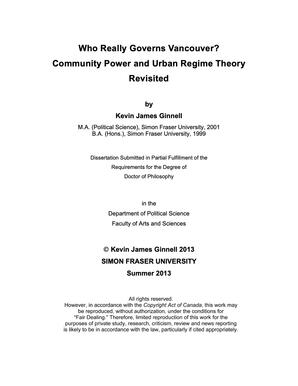Political Science
Related Works
Content type
Digital Document
Abstract
Liberalism, the political philosophy created in the name of freedom, has, because of its complicity with structures of power organized for the production of permanence, in the history of the modern west, been transformed into an ideological template for the rationalization of moralized power politics, thus abrogating prior fundamental commitments to the freedom of humanity. From ancient to contemporary, with a special focus on the middle-modern milieu, this project traces through western concepts of liberty and their connection to structures of power and authority, both within the west and beyond it, as well, for example through the use of liberty as the handmaiden of power politics in the sphere of international relations and the politics of economic development.
Following this historical and philosophical study of the phenomenology of freedom, encompassing in division one a study of the structure of the idea of freedom in liberal thought and in division two a consideration of its effects in recent histories of international relations, division two thereafter concludes with an alternative conceptualization of freedom inspired by a thorough-going ethical embrace of impermanence as a linchpin in a fundamental and ontological notion of being-in-the-world.
A newly-enriched and imaginative liberalism offers a possibility for an ethical ground for politics organized for the greatest freedom of each person in a complex age. The onslaught of technological rationality has resulted in an enframed world of power underscored by the ubiquitous manipulation of technique and gesture, leaving the human-animal at the mercy of thoughtlessness in the service of technologically-manufactured permanences now merged with being. This complexity has become an illusory end-in-itself, obscuring our collective and individual experiences of being, and the contingency, and impermanence, of being. As such, we must, as beings whose existences are at issue, determine, through critical rethinking, how political thought should proceed in freeing beings for the possibility of evolution, survival, and the ongoing practice, of being free.
Origin Information
Content type
Digital Document
Abstract
This dissertation critically examines the moral and political philosophy of T.H. Green in order to assess his reconceptualization of individuality, freedom, and rights within a common good liberal framework. The objective is to expand out understanding of Green's version of liberalism. There are four main themes: (1) Green's conception of individuality is appraised and upheld as a substitute for liberal individualism; (2) the role and place of values, virtues, and a conmon good in his moral philosophy are explored and defended vithin a liberal context; (3) Green's concept of political obligation, one based on a common good, is reviewed in order to demonstrate the liberal character of his apptoach; and (4) an attempt is made to extract from Green's texts a consistent theory of individual rights. The dissertation supports Green's revised conception of political obligation and his general theory of individual rights revolving around a liberal common good.
Origin Information
Content type
Digital Document
Origin Information
Content type
Digital Document
Abstract
The central research question herein is “how do coalitions of government and non-government actors get created and influence the decision-making processes of municipal government in Vancouver, British Columbia?” The goal of this effort is to better understand “who really governs?” (Dahl, 1961) at the municipal level of government in the city during two ‘adjacent’ eras – the development of the post-Expo ’86 lands in the late 1980’s and early 1990’s, and the creation and implementation of the Vancouver Agreement (VA), including the development of Vancouver as North America’s first supervised/safe injection site/harm reduction model, in the late 1990’s and early 2000’s. This dissertation considers not only the structures, actors and ideas of municipal governments but also the creation, influence and power of the various coalitions, the urban regimes, as defined by Stone (1989), that form around local decision-making. It is clear from this examination that coalitions of government and non-government actors, urban regimes, were created and influenced the decision-making processes involved in the development of former Expo ’86 lands and the creation and implementation of the Vancouver Agreement. In addition, there were continuities and discontinuities identified, linked to the type of policy being considered by the Vancouver municipal government. In sum, this analysis found that the nature of the decision-making processes, and by extension the urban regimes that were created, were issue-dependent. Urban regimes involved in what Bish and Clemens (2008) have described as “hard” (or “engineering”) issues, such as land development, were substantially different in nature to those involved in “soft” (or human policy”) issues, such as the provision of addiction services - the substance of policy issues mattered more than institutions.
Origin Information
Content type
Digital Document
Abstract
The year 2010 constituted a favourable opportunity for the greater descriptive representation of women in the UK Parliament. The parties were publicly competing over the issue; Parliament had its own Committee looking at it; and there were plenty of vacancies for candidates in each of the parties’ held seats, as many more MPs than usual stood down. The outcome was disappointing. There was an overall increase in the number of women MPs – up from 128 to 142 – but this was only a 2.5 per cent increase on 2005. Inter-party differences remain. The Liberal Democrats witnessed a decline in the number and percentage of their women MPs and candidates; the Tories saw a doubling of their number, with women now constituting 16 per cent of their parliamentary party; and Labour has both the largest number and percentage of women MPs. These patterns are best explained by the parties’ different attitudes towards equality guarantees – measures that, all other things being equal, return women MPs to Parliament. In other words, Labour's All Women Shortlists once again delivered. The other parties’ efforts were simply less efficient at translating women candidates into MPs. Looking to the future, the picture is far from rosy. The Coalition's plans for political reform will likely increase competition for selection at the next general election to women's detriment, and the impact of the Independent Parliamentary Standards Authority raises the possibility that their supply might decrease too.
Origin Information
Content type
Digital Document
Abstract
Presentation embargoed pending a permission.
Conference presentation delivered at the <a href="https://www.ecpg.eu/">European Conference for Politics and Gender / ECPG</a>, (June, 2017), in Lausanne, Switzerland.
The extant literature on political representation demonstrates white men dominate political legislatures (Murray, 2014), whilst women and ethnic minorities are under-represented relative to their proportion of the population (Hughes, 2009). This pattern holds true for both the UK and Canada, although the UK House of Commons has moved closer to gender balance than Canada’s, while Canada’s House of Commons has moved closer to mirroring the country’s ethnic composition than has the UK. This paper longitudinally explores these representational differences. The research is underpinned by an intersectional analysis exploring the multiple ways in which gender and ethnicity interact at both the party level and in the national media. We argue the specific construction of ‘problematic’ political identities, influenced by the interaction between racialized and gendered stereotypes, makes it especially hard for ethnic minority politicians to become elected. Although the under-representation of ethnic minority women in the UK and Canada has attracted scholarly analysis, less attention has been paid to the ways in which gender and ethnicity interact to affect the representations of male and female ethnic minority politicians. Accordingly, this paper provides a multi-year comparative overview of ethnic minority descriptive representation in the UK and Canada and analysis of party responses to address ethnic minority under-representation.
Origin Information



